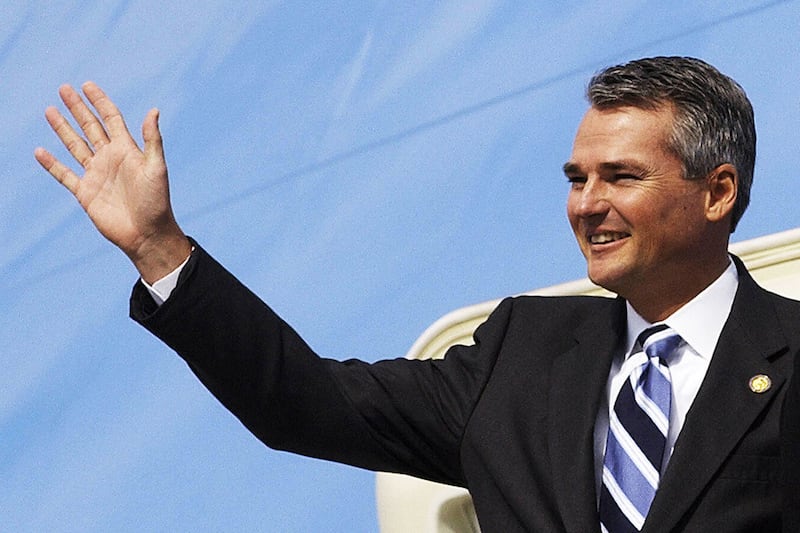Congress is set to return today to face a looming fiscal cliff, and Chris Chocola, the head of the Club for Growth, has a message for his fellow conservatives: compromise at your peril.

“I think the word compromise is a copout. How about instead of saying we are willing to compromise, we say we are engaging in solutions that actually do something. Compromise is an irrelevant word when you are not solving problems, when you are just kicking the can down the road, which is historically the kind of compromises we see. People use words like that as a shorthand, but let’s focus on actual solutions.”
The fiscal cliff came about after Republicans and Democrats were unable last year to reach agreement on a plan that would reduce the nation’s deficit, and so an agreement was struck—either come up with a workable plan to reduce the debt, or a series of spending cuts would be levied automatically in the defense and domestic programs. This, plus the scheduled expiration of the Bush-era tax cuts—which President Barack Obama would like to be extended for all but the wealthiest—and the expiration of some unemployment benefits means that the nation could be facing a fiscal crisis just as it is slowly regaining economic health.
In the wake of an election that delivered something of a blow to Republican orthodoxy, the conventional wisdom out of Washington has been that now the GOP must ignore those lines in the sand they have been drawing for most of the Obama presidency and sit down to negotiate with Democrats. The only way out of the nation’s fiscal mess, the thinking goes, is a mixture of tax hikes and spending cuts, especially since President Obama stated on election night that he would be unwilling to achieve balance by cuts alone.
“Why would you do that?” Chocola said about Obama’s call to raise taxes on those making over $250,000 a year. “It is not a solution. We wouldn’t support that, because it doesn’t do anything.”
Republicans are likely to listen. Chocola is no mere inside-the-Beltway bomb thrower. The Club for Growth was Tea Party before Tea Party was cool, challenging entrenched and incumbent Republicans who voted for tax increases or to increase the size of government. The group burst on the scene in 2004 when, backed with corporate cash, it supported Rep. Pat Toomey in a primary against centrist Sen. Arlen Specter. Toomey lost, went on to become the club’s president, and Specter was so scarred by the experience that he left the Republican Party altogether.
This time around, the Club was responsible for some of the conservative movement’s greatest triumphs, and the kind of losses that analysts believe will keep the GOP from being a majority party for the foreseeable future. The Club backed archconservative Ted Cruz in the GOP Senate primary in Texas, for example. Cruz crushed the establishment’s pick and quickly became a favorite of the Tea Party set. But other bets fared less well. The Club backed Mark Neumann in a bitter Senate primary in Wisconsin; former governor Tommy Thompson went on to win the primary but entered the general election badly weakened and lost to Democrat Tammy Baldwin. And the Club enthusiastically supported Richard Mourdock in his Senate candidacy in Indiana. Mourdock pushed aside longtime moderate Republican Richard Lugar, only to lose in the general election as well.
“Our job isn’t to build a Republican majority,” Chocola, himself a former Indiana congressman, said. “The people we have supported are champions of economic freedom. And now when people talk about the future of the Republican Party, they include names like Marco Rubio, Pat Toomey, Ted Cruz. And the Club for Growth was the only organization that would support those candidates before anyone knew who they were.”
Now, as Republicans and Democrats strive to find bipartisan compromise before the nation goes spiraling off the cliff, Chocola represents one of those voices standing athwart the negotiating table, yelling "Stop." In an interview, he made clear that any Republicans who don’t support “pro-growth policies” could find themselves with an unwanted primary challenge the next time they face the voters.
“It’s a possibility. It depends on who they are. There are a lot of things that go into an endorsement process,” he said. “I think anyone who votes to raise taxes is susceptible to a primary challenge, whether it be from us or someone else. If people want to write a story about an ‘uncompromising right-wing group,’ they can, but I think compromise is the wrong word.”
Instead, Chocola noted, as Republicans talk about modernizing their party, they should focus less on moderation and more on sincerity.
“I believe very strongly that the hurdles candidates have to clear is that voters believe that you believe something, and sometimes that you believe in something is more important than what you believe,” he said. “I am not criticizing Mitt Romney, but I believe you have to be convincing in your beliefs, and Romney had a sincerity gap he wasn’t able to clear. I don’t think Republicans have to be more moderate at all. I just think they have to be more convincing.”





